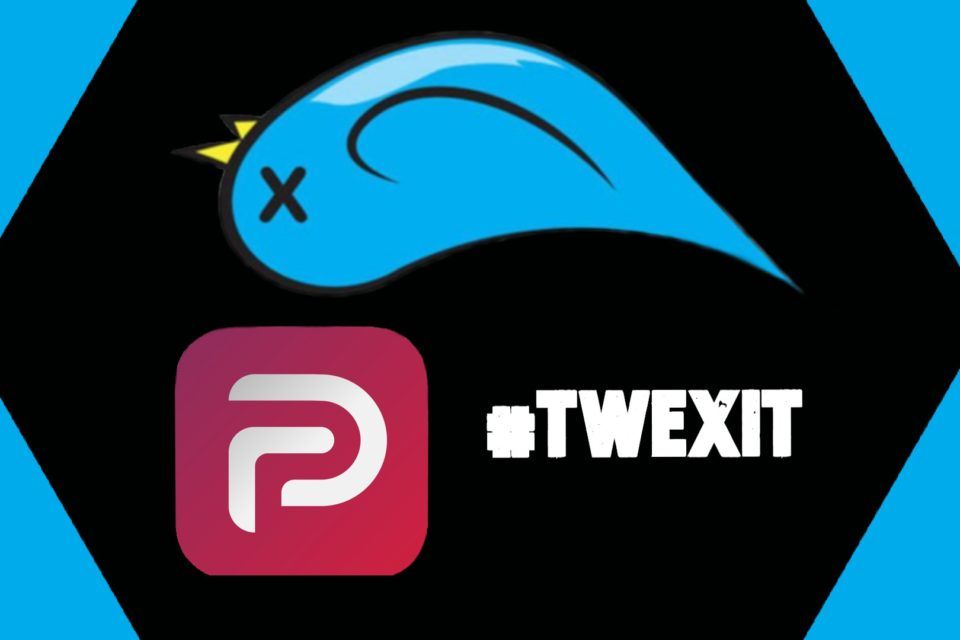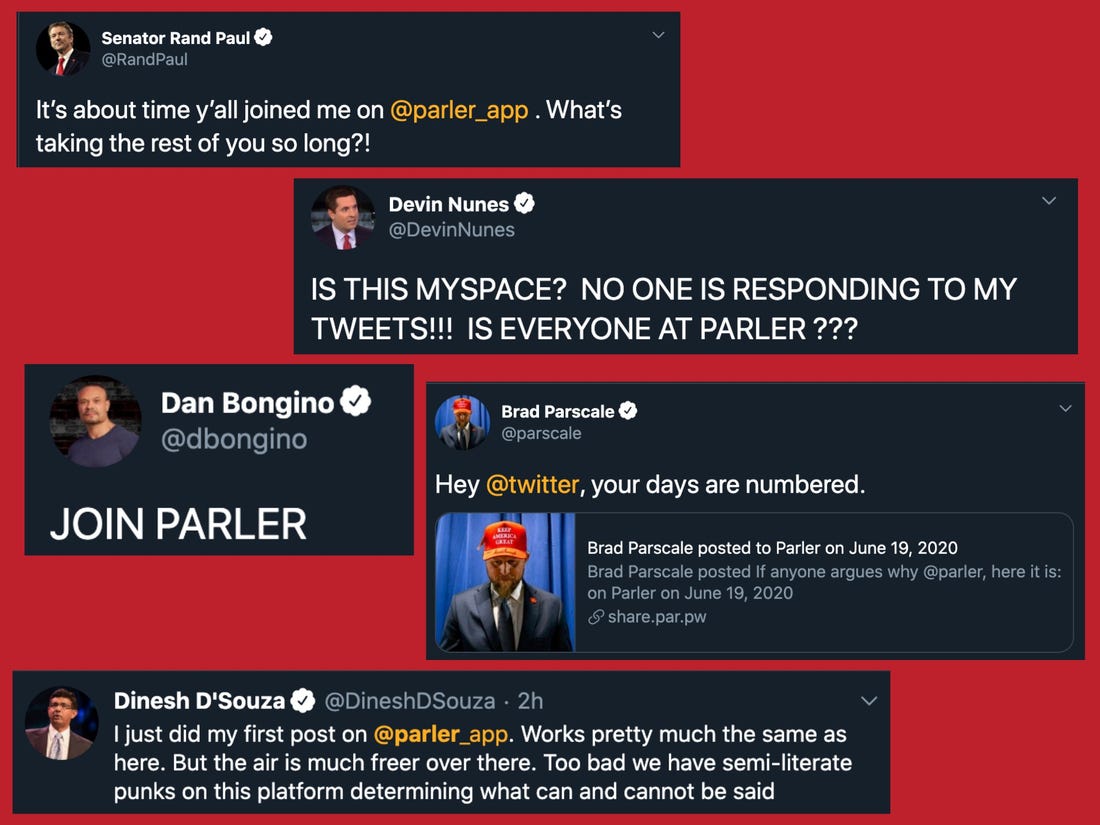What is Parler and why do Trump supporters want it to replace Twitter?

A few minutes every morning is all you need.
Stay up to date on the world's Headlines and Human Stories. It's fun, it's factual, it's fluff-free.
With Twitter recently adding warnings to some of President Donald Trump’s tweets, the platform has been accused of actively censoring conservative voices.
In the wake of this alleged censorship, a so-called “twexit” of conservative users has led to increased attention on a newer social media platform called Parler, which says that it “is a non-biased free speech driven entity.”
Parler claims to be a platform where users can express their views without fear of censorship. Still, while its embrace by the Trump campaign and prominent conservative figures has helped boost its numbers, Parler remains a platform with little diversity of opinion. As it stands, without an influx of liberal users, Parler looks likely to remain niche.
John Matze and Jared Thomson, creators of Parler
Though Parler has gotten considerable attention of late, it has been around for over two years.
Created in 2018 by two University of Denver graduates, John Matze and Jared Thomson, and based in Henderson, Nevada, Parler’s website says that the duo were inspired to create the platform due to feeling “exhausted with a lack of transparency in big tech, ideological suppresssion [sic] and privacy abuse.”
Matze’s LinkedIn profile says that he attended the University of Denver from 2011 to 2014 where he graduated with a Bachelor of Science in Computer Science and a minor in mathematics. Thomson attended from 2011 to 2015, graduating with bachelor’s and master’s degrees in Computer Science, as well as a BS in mathematics and a minor in physics. Both were members of the Lambda Chi Alpha fraternity.
On his profile, Matze says that he is the chief executive officer and iOS Developer for Parler. The development of Parler was done “under strict restrictions of no Google products.” Matze has also marketed the platform on Fox News, OANN, BlazeTV and at CPAC 2020, all conservative outlets.
Thomson’s profile includes far less information about Parler, noting only that he is the Founder and chief technology officer (CTO) and that Parler is a “commenting and social media platform.” He describes himself as a “Young and energetic computer scientist who focuses on object orientated programming.”
While the inspiration for the name is the French word for “to speak,” “parler” (pronounced “par-lay”), according to Matze in a Fox News interview from 2019, the app’s name is pronounced like the word “parlor.”
The values of Parler
In that same Fox News interview, Matze stated that he didn’t think of Parler as an alternative to Twitter, but rather as what that social media platform should have been from the beginning, a “community forum.”
The site says the goal of Parler is “to offer the world a platform that protects user’s rights, supports publishers and builds online communities” while “empower[ing] users to control their social experience.”
Listed under “Our Values” are four categories: “Empower Users,” “Innovation,” “Build Communities” and “Free Speech.”
Despite Matze promoting the platform on conservative media outlets and Parler’s support from conservative pundits and politicians, the site avoids any mention of political allegiance. Instead, it says that Parler is a platform for “digital publishers, influencers, bloggers, writers, politicians and social users to share news, opinions and content in real time.”
Who’s the typical Parler user?

Upon signing up for a Parler account, users are given a list of recommended publications and users to follow, all of them prominent conservative and/or pro-Trump figures. These include Breitbart News, The Epoch Times and The Daily Caller.
Recommended users include radio hosts Dan Bongino and Mark Levin, both outspoken supporters of Donald Trump with sizable Twitter followings. Both men have publicly advocated for a “twexit” of Twitter users to Parler, yet both have continued to actively use their Twitter accounts.
The site also promotes Laura Loomer and Katie Hopkins, two conservative figures who have been banned from Twitter. Loomer was banned in 2018 for abusive, anti-Muslim tweets aimed at House Representative Ilhan Omar. Hopkins, a conservative English media figure, was permanently banned from Twitter earlier this month for “hateful conduct.”
While there are multiple accounts that appear to belong to Trump at first glance, including @presidentdonaldtrump and @TweetsFromTrump (the former of which has a “Verified Real User Badge”), the president is not yet on Parler.
Others in Trump’s orbit, however, appear to be using Parler, including the president’s son, Eric Trump (and Eric’s wife, Lara), Republican Senators Rand Paul and Ted Cruz, and Republican Representatives Devin Nunes and Paul Gosar. As of June 25, the president’s current press secretary, Kayleigh McEnany, also has an account.
All of those Parler accounts include a yellow “Verified Influence Badge,” which is similar to the Twitter blue checkmark. The yellow Parler badge indicates “users with a large following who run the risk of being impersonated. The purpose of these badges are to protect the user’s authenticity.”
The Parler experience
The Parler user interface heavily mimics Twitter’s functionality. A Parler user can parley (tweet), comment (reply) on another user’s parley, echo (retweet) another user’s parley (with or without commenting), upvote (like) a parley and share a parley through other apps and sites.
The biggest difference comes when comparing Twitter’s 280-character limit to Parler’s 1,000-character limit.
Though Parler exists to provide a “free speech” platform for all viewpoints, it has yet to draw many non-conservative users. Even with Parler becoming the most popular app in the iPhone store and the number of users increasing to 1.5 million from 1 million in a matter of days, Matze is so concerned about the lack of alternative political viewpoints that he has made a peculiar offer. If a liberal pundit with at least 50,000 followers joins Parler, Matze says he will give them US$20,000.
It isn’t clear how Parler would handle the types of contentious debates and attacks that regularly occur on Twitter. The “Community Guidelines” on Parler’s website warn users against defamation, threats of harm, blackmail and doxing, all potentially illegal activities. It also forbids pornography and “indecency” (for instance, images portraying genitalia), both of which are allowed on Twitter.
Is there really a Twexit for Parler?
While Parler has experienced considerable growth in recent weeks, it will be months, at least, before any correlation with Twitter’s user activity can be determined.
Twitter’s monthly active users (MUA) remains high, with 330 million in the first quarter of 2019. That’s a decline from the platform’s high of 336 million MAU in the first quarter of 2018, but Twitter remains one of the most popular social media accounts.
MAU is different from users. MAU measures every person who engages with a website, regardless of whether they are signed up to the platform. While Twitter’s monthly active users have decreased somewhat, the platform has seen a steady growth in users worldwide, reaching 275 million this year.
In terms of advertising dollars, MAU is considered more important for potential investors.
Gab, the alternative to Parler?
Parler is hardly the first social media platform to serve as a conservative-minded alternative to Twitter.
Launched in 2016, Gab was immediately dubbed “Twitter for racists” as it sought to build its reputation as a platform for completely unfettered free speech. Its site states that Gab is a platform that “champions free speech, individual liberty and the free flow of information online.”
Four years later, Gab has failed to catch on with a wider audience and these days it serves almost entirely as a platform for far-right users. In hopes of building relevance, Gab has been attempting to lure Trump to the site, so far without any luck.
Gab has been repeatedly criticized for hosting anti-Semites, even being temporarily shut down after it was linked to an attack on a Pittsburgh synagogue in 2018. As such, the platform has struggled to prove itself as anything more than a digital gathering place for the most fringe political beliefs.
Have a tip or story? Get in touch with our reporters at tips@themilsource.com




Comments ()